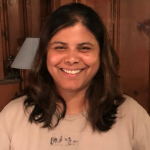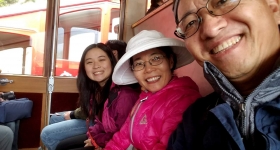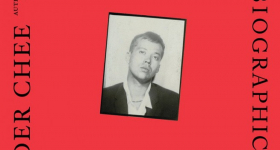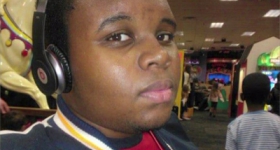Home plate was the humpy, ridged roots of the tree trunk. The huge old tree, perhaps an oak, was in our rectangular, forest-like yard. There was no grass, just leaves in the fall and shade in the spring and summer, and packed dirt all year round on the ground. It was where we played baseball.
The yard’s longer side ran parallel to the house and was about 50 feet in length; the shorter side was 20 feet. We pitched and batted on the longer side and ran to bases on both. The fenced grounds of a private school bordered first base, and a narrow driveway hugged third. Near second base was the half-moon-shaped parking lot for the house. Many of our neighbors did not own cars; those that did parked some distance away in the summer to avoid our baseball missiles.
Home plate was where I first learned to bat, and our yard was where I first made friends in America.
***
I was about 10 years old the first time I swung a baseball bat. It was in the early 1980s, just two or three years after having arrived from Nepal. For several years, my family and I lived in graduate school housing funded by Bryn Mawr College, where my mother studied anthropology. Just under two years apart, my younger brother Vivek and I were close enough in age to play together.
Just as he is today, Vivek was more socially outgoing between the two of us. Back then, at 8, with his chubby cheeks and toothy smile, he attracted people without even trying. In pictures from the time, I can see I seldom smiled. I carried myself very seriously, purposefully: I was serious in school, serious in friendship, serious about life, serious about being the responsible older child. My parents strictly instructed me to take care of my brother, and I did so — sometimes grudgingly because watching him got in the way of my own fun.
But not when it came to baseball, a sport my brother introduced me to. It was Vivek’s friend Aaron who taught us how to play. About the same age as my brother, Aaron had grown up in the tri-state area around Philadelphia with his father, a painter, and his mother, an art historian who taught at the same school my mother attended. Though our mother was an artist in her younger days, rheumatoid arthritis had since stiffened her fingers; her thirst for a terminal degree made her mostly a student at that time in our lives. Our father worked as a purchasing agent at a plastics manufacturing firm. We all lived in housing owned by the college, and as the only children around, we found each other and forged a companionship through games of tag.
Soon, with the arrival of a family with two kids from the Netherlands, as well as a family from Stamford, CT, with two girls who were of the same ages as my brother and me, we formed our neighborhood baseball team. I don’t remember how the first game started, but it must have been because of Aaron, who loved baseball. He and my brother convinced us that we could all play the game. It was summertime, and school was still a few weeks away. What a group we formed: two brown kids from Nepal, one white American, two white teenaged Dutch kids and two young African American girls.
The house where Vivek and I lived with Aaron and the Dutch kids was a three-story red brick colonial. Calling it a house isn’t exactly correct; it was more like a small mansion. Built during 1913 and 1914, the home had a name, Bettws-y-coed. We called it “Betsy Coed.” In the warm months, we took over the grounds of the colonial as if we were the only ones living there, although we weren’t — the house was partitioned into several flats, which the college rented to its graduate students and professors. The house also had an attached two-story wing, where my family lived. Aaron and the Dutch kids lived in the main part of the house, which had a central stairwell reminiscent of the one from The Sound of Music. There were other occupants, such as the music professor from France, an English professor who drove an army-green colored Impala and a linguistics professor whose joints, like my mother’s, were troubled by rheumatoid arthritis.
Our baseball yard was on the colonial’s east side. On summer days, we played one game after another, sometimes irking our neighbors whose glass windows lay exposed to our wild throws and even more unpredictable hits. We had divided ourselves up into teams, so we alternated as friend or foe by game or by day. On those days, it seemed that time bent to give us more hours of camaraderie.
Often, the competition was boys against girls. We argued about the typical stuff: safe or out, foul or in play, strike or ball. We cheered a base hit. We dwelled on a missed catch. So and so didn’t play well, we complained. Still, with each sprint to a base or an aggressive bat to ball or an assertive catch, we dedicated ourselves to the game. Dirt smudged our cheeks as often as spit and laughter flew out of our mouths. We each played different positions, even taking turns pitching. Trying to become better. Home runs were common yet nevertheless awesome. The dirt patch seemed as big as a baseball diamond the Phillies played in. I was good at hitting. Hank Aaron was the nickname I earned, a badge of honor. Especially when my brother and Aaron conferred quietly behind mitts on preventing my next homer.
***
Our summer baseball team came to an end when the Dutch kids moved back to the Netherlands. A few years later, Vivek and I moved with our parents to another town and another school district. Aaron went to private school.
In new high schools, Vivek and I pursued sports to make new friends. My brother found soccer and lacrosse. I played volleyball. I wasn’t any good at the level of sports played in high school. I was a benchwarmer, even in practice. I realized that I was trying sports just for my academic résumé, so I could be that well-rounded prospective student that liberal arts colleges wanted. I became introspective, turned to the one activity that would let me think and forget about others: running. I joined the cross-country team. Yet it was the walkthroughs of the grounds before the meet that I warmed to the most, not the competition itself. There was nothing heartwarming in that. But the walks, they were almost peaceful, in spite of my anxiety over the meet ahead, when the peace would give way to someone coming in first and someone coming in last. Or perhaps it was the locker rooms. I didn’t like their crowdedness or their ability to expose my vulnerabilities. My physicality was on display, and I struggled to keep it from being judged.
In 1989, my last year of high school, Vivek moved with my mother to Oneonta, NY. A university there had offered my mother, who now had her doctorate, a few years of professorship. I remained with my father in the outskirts of Philadelphia, where he had a full-time job. That year, my dad and I would visit New York often; still, the year apart changed how my brother and I would interact for many years thereafter. He became a handsome, soccer-playing socialite in high school; I became more of a loner, a studier, who graduated high school as a salutatorian.
If my brother and I had shared that year together, he would have experienced my college application process. But that didn’t happen. While he was living in upstate New York, I was returning to the familiar; when it was time to select a college, I chose Bryn Mawr, so I could live again in the town where we had spent our first American years as a family. Even though we had both stored away our baseball memories and our childhood. Still, perhaps as a way to regain that sense of companionship with people, I played rugby my freshman year. I was so skinny that my position was a wing, but I was prepped in practice to tackle a woman a whole foot taller than my 5-foot-2 frame. And it was in that rare moment when I actually had the ball that I valiantly ran into the chin of my own teammate and cracked my head open. Though that ended my rugby playing days, I would go on to try Ultimate Frisbee, in which I would finally find a group of teammates who thought like me: fun over competition.
***
In the college years and those that followed, my brother and I lived mostly apart. He selected architecture as his discipline, and I selected health care. He lived in Philadelphia, and I moved around: from Bryn Mawr to Cedar City, UT, to Atlanta, GA, to St. Paul, MN, and to Richmond, VA. Though my brother and I met up for holidays and family gatherings, we couldn’t recreate that joyous bond of our childhood.
Yet even without my brother as company, I’ve returned to baseball, not as a player but as a spectator. In my late 20s, I started dating Dan, who was once a pitcher for his high school baseball team in Michigan. In 2013, we watched our nephews play baseball and reminisced over our youth. In 2014, thanks to our friend Gord, we went to see the Orioles play the Tigers in the American League Division Series at Camden Yards in our new hometown of Baltimore, MD. And we watched it until the end, even though the Tigers, the team we were rooting for, lost.
I looked around the stadium that was filled with fans wearing orange and chanting, “We won’t stop,” at the top of their lungs. I got goose bumps.This is what baseball is about, I thought: trying, then trying some more.
When I watch baseball now, I remember and pay homage to a sport that helped me laugh and make friends as a new child in America. Baseball first enabled me to feel that I, too, could belong in my new country — that even with roots in Nepal, the humpy and ridged home plate was just that: home.
***
Sources:
Bryn Mawr College. Building information: Bettws-Y-Coed. Bryn Mawr College website.
Montgomery County, Pennsylvania, Recorder of Deeds. 1992. Bettws-Y-Coed, Bryn Mawr College, Parking Expansion. Record number: 1992086686. Parcel number: 40-00-36728-00-6. Montgomery County Recorder of Deeds website.










Comments